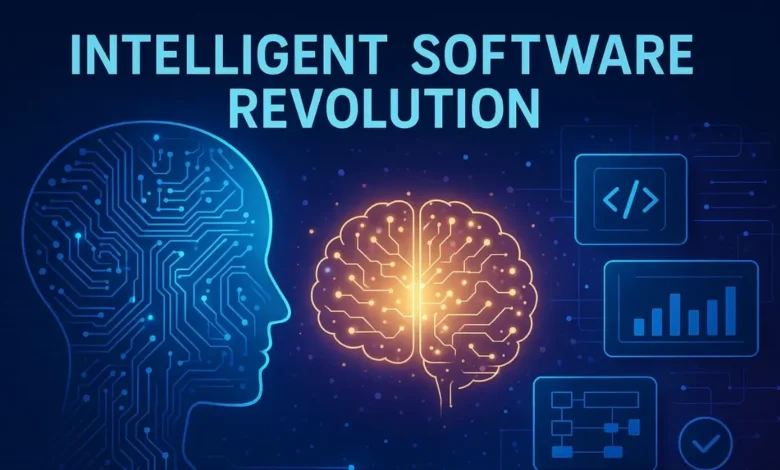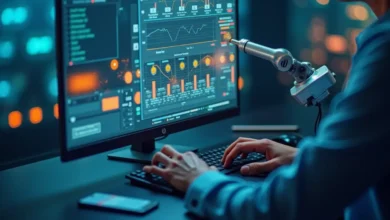The Intelligent Software Revolution

The rise in intelligent software is transforming virtually everything in the contemporary world. Automating processes in the workplace to transforming customer experience and generating technological innovation, intelligent software has seamlessly integrated itself into industry and our everyday life. What makes this technology significant? This blog examines the most important aspects, challenges as well as the exciting, yet complicated the future for intelligent software.
If you’re a professional an entrepreneur or a person who is fascinated by technological advancement, this study will allow you to understand the ways in which intelligent software is driving change across all industries and societies.
Table of contents
- The Impact of Intelligent Software on Workplace Productivity
- Ethical Considerations in the Development of Intelligent Software
- The Evolution of Intelligent Software
- Challenges and Opportunities in Healthcare
- Contributions of Intelligent Software in Autonomous Vehicles:
- Transforming Customer Experience in the Digital Age
- Societal Impacts and Final Thoughts
- FAQs :
The Impact of Intelligent Software on Workplace Productivity
Intelligent software has revolutionized productivity at work. routine tasks like the entry of data, scheduling and managing email can be now automatized leaving time for workers to concentrate on innovative and strategic plans.
Examples of Productivity Gains:
- Personal Assistants(like Microsoft’s Cortana and Google Assistant) help with managing calendars, reminders and prioritized assignments.
- Collaboration tools(like Slack and Microsoft Teams) offer enhanced remote working capabilities, and integrate AI capabilities that can automate message replies and schedule meetings with ease.
- Innovative automation tools such asZapier as well as UiPathsimplify workflows, making it easier for humans to make mistakes and improve precision.
Companies that incorporate intelligent software report significant growth in efficiency. This allows organizations to do more with lesser resources. The leaders must understand the best way to use these technologies to maximize their team’s potential to its fullest.
Ethical Considerations in the Development of Intelligent Software
The emergence of intelligent software brings ethical dilemmas into the spotlight. What can we do to ensure that there is no bias in AI making decisions? Are AI systems allowed autonomy which could impact people’s lives? The developers are currently being asked to incorporate ethical standards within their efforts to minimize unwanted consequences.
Key Ethical Concerns:
- Bias and Fairness:
Intelligent systems are able to perpetuate the negative biases that they’re conditioned to use. As an example, AI used in hiring processes was found to discriminate against specific populations due to bias in training information.
- Accountability:
If intelligent software fails, who’s accountable? This issue is especially pertinent for areas such as healthcare and autonomous automobiles.
- Transparency:
The consumer must understand the way that intelligent systems decide. But, the majority of AI algorithms operate as opaque, rendering the operations of AI difficult to comprehend.
Potential risks require an approach that is collaborative between groups, developers, and the policymakers in order to encourage sustainable innovative thinking.
The Evolution of Intelligent Software
Intelligent software has undergone an important evolution.
- Past:
Initial in Intelligent systems of the beginning relied upon rules and relied on programed commands. Technologies like Eliza (a chatbot that was created in the 1960s) set the trend.
- Present:
Contemporary intelligent software leverages machine learning (ML) and deep learning to study patterns, adjust to the latest information and make smart choices with the least amount of human involvement.
- Future:
As quantum computing advances and the ability to understand natural languages, intelligent software is poised to create complex scenarios processing huge quantities of data instantly and offer real-time forecasts.
From chatbots to advanced predictive analytics tools intelligent software is evolving into an essential component of the backbone of businesses all over the world.
Challenges and Opportunities in Healthcare
The healthcare industry has greatly benefited greatly from intelligent software, yet it is also a source of unique difficulties.
Opportunities:
- Tools for diagnosis using AI, such asGoogle HealthandIBM Watsoncan detect diseases based on scans, with precision levels that are comparable to or surpass human physicians.
- Intelligent software allows wearable devices to track patient’s vitals on a continuous basis and provide actionable information at a moment’s notice.
- It has also been possible to speed up drug discovery by using AI models that forecast molecular interactions.
Challenges:
- Data Privacy:
Healthcare institutions handle confidential patient data, and security breaches could have devastating negative consequences.
- Integration:
The existing healthcare system often has trouble to fully integrate the latest innovative technology.
- Bias:
Medical AI systems need to be scrutinized carefully to ensure that they do not result in bias or unjust results when it comes to treatment.
The next step is to strike an appropriate balance between technological advances and ethically sound procedures.
Autonomous Vehicles
The most exciting uses that make use of intelligent software is in the advancement of autonomous cars. Companies such as Tesla, Waymo, and Cruise use AI-powered technologies to improve safety, navigation and even decision-making.
Contributions of Intelligent Software in Autonomous Vehicles:
- Real-time object recognition recognizes pedestrians, cars, and other obstacles.
- To have a good adaptation and reaction to changes in driving, predictive algorithms are a good tool in this sense.
- In order to improve fuel usage, the optimization tool is essential for this purpose.
Yet, this industry faces many obstacles, including government approvals, public trust and safety guidelines. However, despite these hurdles, intelligent software continues to bring the auto industry closer towards full automation.
Data Security and Privacy Concerns
The increasing dependence on intelligent software raises critical concerns regarding privacy and security of data.
Key Risks:
- Cyber Attacks:
AI systems, when compromised are able to disrupt anything including healthcare devices.
- Personal Data Misuse:
Firms that have intelligent software have immense data ability to retrace their steps. The transparency of how the data is used is vital.
- AI-Enforced Cybersecurity:
It is interesting to note that intelligent software is being used to solve both the issue and solution. Artificial intelligence cybersecurity tools such as Darktrace can detect dangers faster than any human group could.
To tackle these issues companies must implement strict security measures while making sure of the compliance of regulations such as GDPR.
Transforming Customer Experience in the Digital Age
Service and experience for customers are being transformed by AI-driven intelligent software. Bots and recommendation engines, chatbots and analytics tools have created seamless interaction for today’s consumers.
Examples Transforming Business-to-Customer Interactions:
- Recommendation Systems:
Amazon, Netflix, and Spotify create personalized suggestions according to user behaviour.
- Customer Support Chatbots:
Digital assistants such as Zendesk and Drift simplify routine questions by interacting with a human, and provide exact and efficient data.
- Sentiment Analysis:
AI tools analyse customer reviews as well as social media mentions, to determine the public’s sentiments, which allows businesses to take action.
These innovations not only increase the customer experience but also help to build the loyalty of brands.
Educational Technology
Intelligent educational software is transforming how children learn and educators teach.
Major Advancements:
- Adaptive Learning:
Platforms such as Duolingo as well as Khan Academy use AI to customize lessons to each pupil’s level of understanding and speed.
- Virtual Tutors:
Smart tutors provide specific learning objectives, providing any questions or concerns instantly.
The tools help bridge the gap between students around the world providing education that’s inexpensive, accessible and effective.
Banking and Financial Services
Intelligent software also opens up opportunities in banking and financial services.
Innovations:
- Credit Scoring:
FinTech AI tools analyze advanced information sets to assess the credibility of an individual’s credit report beyond credit reports.
- Fraud Detection:
AI can detect suspicious transactions and improves security for both banks and consumers alike.
- Investment Choices:
AI provides companies with investment insights tailored to consumers’ needs, and some companies like Betterment and Wealthfront are already using it to respond to market expectations.
This smart integration allows the financial sector to become intelligent, more customer-centric technology.
Societal Impacts and Final Thoughts
Intelligent software has a lot of promise in shaping the future of the future of society. In the field of improving efficiency for industries and enhancing the quality of life The possibilities are numerous. Yet, the technology also poses critical social concerns like the possibility of job loss as well as digital divides and ethics-based responsibility.
In order to fully realize its full potential Collaboration between tech experts, organisations and decision-makers is vital.
Through understanding and using intelligent software thoughtfully, industries are able to transform obstacles into opportunities, while also advancing the pace of the pace of innovation. There is no doubt that The intelligent software revolution is here and changing the world.
FAQs :
What is this Intelligent Software Revolution?It’s the evolution of software that adapts and learns and make decisions based on any input from humans. Consider apps that can predict the needs of your business or software that improves their own.
What makes it different from other software?
Traditional software adheres to rigid guidelines. Intelligent software makes use of patterns, data and AI (like machine-learning) to adapt and grow in a way that is completely autonomous over time.
What’s the driving force behind this revolutionary?
The most important technologies are AI machines learning, AI, big data analytics and cloud computing. They allow software to “think” and respond to actual situations.
Could this be the replacement for the human job?
They’ll be changing jobs, but they won’t eliminate the existing ones. The routine jobs (like the entry of data) could be automated, however new positions in AI managing, ethics as well as creative problem-solving are expected to grow.
Are intelligent software safe?
Safety depends on design. A rigorous test, transparent and ethical standards will help reduce risks such as bias-based decisions or security holes.
What is it that benefits your daily routine?
Examples: Smart devices for home use respond to your preferences and health apps provide personalized guidance while traffic apps guide users in real-time so that you can get around traffic jams.
Small businesses can make use of it for a reasonable price?
Yes! Cloud-based AI applications (like chatbots and analytics) provide pay-as-you-go services which makes advanced technology accessible without massive upfront costs.
What’s coming next in intelligent software?
You can expect seamless integration. Your gadgets, tools for work, and even services work while in the background, anticipating requirements before you even ask.
